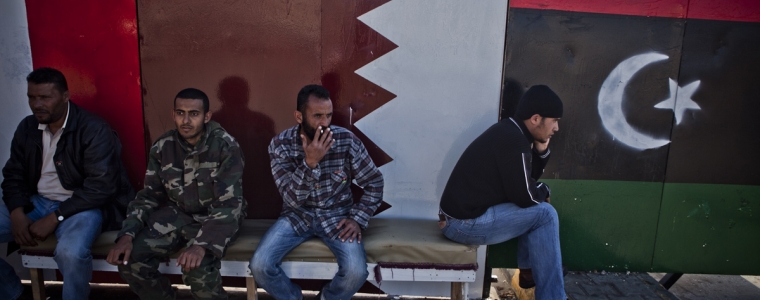Trust: An Essential Ingredient in Building Peace, Justice and Security
By Colette Rausch, Director, Rule of Law Center of Innovation; USIP

Peace is more than just the absence of conflict. Peace is the presence of mutually respectfulrelationships among individuals and groups. Those relationships enable disputes to be handled with tact, understanding, and a recognition that everyone shares some common interests. At the heart of those relationships is trust. USIP's Colette Rausch reflects on her recent trip to Libya.
Introduction
“Why are you here? What interest does the United States Institute of Peace have with Libya?”
Full of uncertainty, suspicion, and even a little fear, the questioner spoke for some of the Libyan participants at a workshop in the battle-scarred city of Misurata. It was June 2012, and my colleagues and I had come there from USIP’s headquarters in the heart of Washington, DC, to facilitate a workshop on justice and security. We had just introduced our Libyan hosts to the packed two-day agenda that we had planned for them, and we were all taking a short coffee break before getting down to business.

Photo courtesy NYTimes
But then, as the presenters and participants congregated in small groups—little islands of familiar faces nervously scanning the unfamiliar faces on other islands—one man caught my eye, walked quickly over to me, and asked with transparent concern, “Why are you here?”
We had an agenda, participants, and even refreshments—but, evidently, we did not have trust.
Peace and Trust
Peace is more than just the absence of conflict. Peace is the presence of mutually respectful relationships among individuals and groups. Those relationships enable disputes to be handled with tact, understanding, and a recognition that everyone shares some common interests. At the heart of those relationships is trust.
Trust cannot be coerced, delivered, or manufactured. It develops through a process of collective engagement and through a commitment to a common purpose. Where that process is brand new and where that purpose is vague or open to question, trust does not come easily. Which brings us back to Misurata.
Read the rest of the article [HERE].
Tags:
Replies to This Discussion
-
Permalink Reply by John C. Turley on October 23, 2013 at 4:14pm
-
I was also asked “Why are you here?” when I visited Ethiopia, Afghanistan, Pakistan, Tanzania, Sudan, E. Germany, Russia, and Venezuela on business during periods of internal strife, international, civil wars, and poor relations with the USA. As I waited on line to clear customs in Ethiopia, a Swiss visitor noticed hat I held an American passport and remarked "I thought that you Americans were banned from this country?" This was another way of asking “Why are you here?” I muttered something about warm relations between my company and Ethiopian Airlines, coincidentally run by the Ethiopian Government. I meekly shuffled forward to present my documents thanks to the internal alarm setoff by the Swiss gentleman. Chocolate and cuckoo clocks!
I was welcome in these countries by my gracious hosts with the inevitable and unavoidable question posed over a drink or meal. My observation is that most of the world does not disassociate the world of American international politics and diplomacy from the American world of business or American good will initiatives. These worlds are one and the same in the eyes of many people throughout the world. I quickly established that I was not undercover for the CIA; however, this did not shield me from receiving harangues from the above countries about the evils of American policies and global practices. A good part of the discussion centered on the American betrayal of his/their nation of (fill in the blank). What can I do about this? Cal the Secretary of State from my hotel room?
Part of it amounts to trust which would need to be established for the above country representatives to buy my professional services which they did. The US Government on the world stage is the culprit. I think that my hosts realized this but this fact did not stop them from blasting my country. Of course, it was not personal, strictly business, but it appeared that they would prefer if I could metamorphose into the President of the US. Then, he would really get a piece of their mind. The experience was invaluable and I never took it personally. It literally was part of a very, very, very, big territory. I could not wait to hear what the French had to say!
About
@ADRHub Tweets
© 2026 Created by ADRhub.com - Creighton NCR.
Powered by
![]()